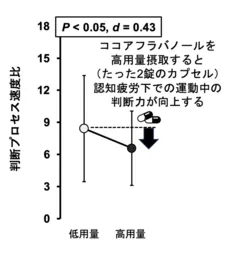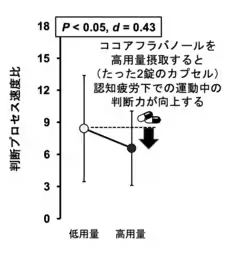

Cocoa Flavanols Enhance Decision-Making in Sports Performance
Cocoa Flavanols for Improved Athletic Decision-Making
Recent research conducted by a team from Waseda University and Ritsumeikan University has uncovered promising findings regarding the benefits of cocoa flavanols for athletes. Sports such as soccer and rugby require not only physical stamina but also quick and decisive cognitive abilities, particularly under pressure. Cognitive fatigue—a decline in cognitive function resulting from prolonged mental activity—can impair these crucial decision-making skills, thereby compromising athletic performance.
The study, published online in Springer Nature’s Psychopharmacology journal, highlights that consuming a high-dose cocoa flavanol supplement (500 mg) just one hour before engaging in sports can significantly enhance decision-making abilities even in the presence of cognitive fatigue. Unlike previous studies, this research emphasizes the necessity to combat cognitive fatigue, which is often overlooked, especially in sports requiring tactical judgments.
The Importance of Decision-Making in Sports
Cognitive fatigue typically arises from extended focus during competitive events. Interestingly, while moderate aerobic exercises are known to enhance cognitive function, the opposite effect—cognitive fatigue—emerges during intensive mental engagement combined with physical exertion. This can drastically affect performance in high-stakes environments like sports matches, where quick judgment calls can mean the difference between victory and defeat.
By focusing on cocoa flavanols, a natural compound with antioxidant properties found in chocolate, the researchers aimed to see if these could offer an effective solution to mitigate cognitive fatigue. Their findings suggest that athletes may benefit from high doses of these compounds prior to events, which can improve performance by sharpening their judgment despite mental exhaustion.
Methodology of the Study
The research utilized a randomized, double-blind, placebo-controlled crossover trial involving high doses of cocoa flavanols. Participants consumed either a high-dose supplement or a low-dose control before exercising. The effects on cognitive performance were evaluated by measuring decision-making speed and accuracy during a 50-minute cognitive fatigue induction protocol tailored to simulate match conditions in soccer.
The results demonstrated a clear improvement in the participants' decision-making performance under conditions of cognitive fatigue after taking the high-dose cocoa flavanol. This not only strengthens the hypothesis that cocoa flavanols can support cognitive functions in physically demanding situations but also opens avenues for further investigation into how nutritional supplements can impact athletic performance.
Future Implications and Areas for Exploration
The implications of this study are broad and suggest that integrating cocoa flavanols into athletes' pre-competition routines could be beneficial. While the findings were promising, the researchers noted that the high-dose cocoa flavanols did not significantly reduce mental fatigue itself, indicating a need for further exploration.
Moreover, the study could pave the way for investigating long-term benefits of cocoa flavanols, especially concerning cognitive decline, as some studies indicate a correlation between high physical activity levels and increased risk of dementia among professional athletes. Addressing the potential preventive effects of these compounds on cognitive health might unveil even more advantages for athletes.
Conclusion
With sports performance heavily reliant on both physical prowess and mental agility, this study sheds light on a novel approach to maintaining cognitive function under stress. Future research could help in devising targeted nutritional strategies for athletes, particularly those engaged in high-stakes sports that require constant situational judgment. As this field evolves, it becomes increasingly evident that what athletes consume can profoundly affect their performance in ways we are only beginning to understand.

Topics Health)










【About Using Articles】
You can freely use the title and article content by linking to the page where the article is posted.
※ Images cannot be used.
【About Links】
Links are free to use.